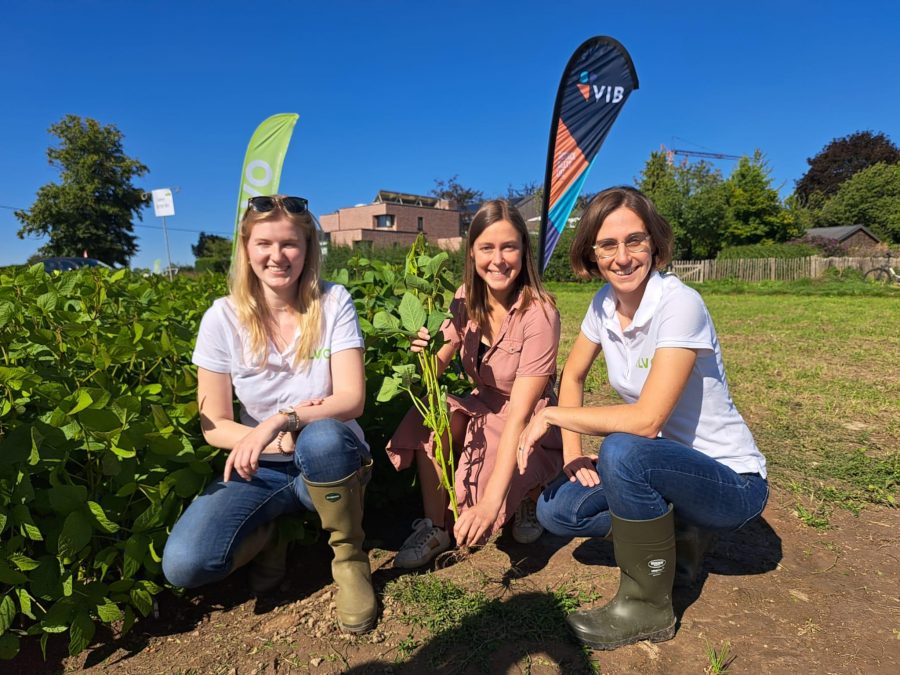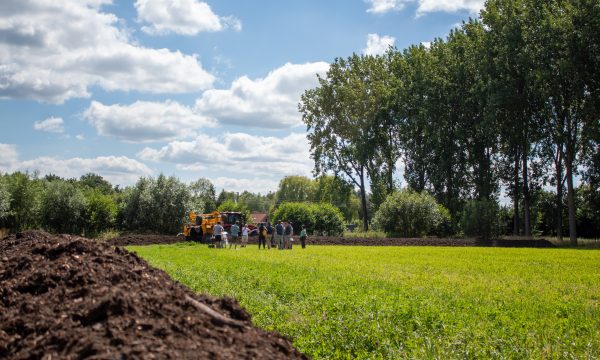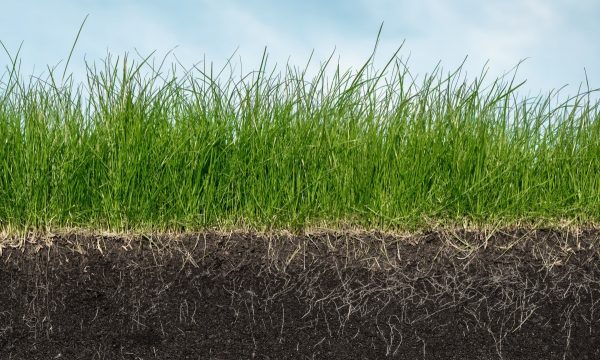Press release First soybean field trials are successful and show efficacy of Flemish soil bacteria.

Local soil bacteria, selected thanks to citizen science project "Soy in 1000 gardens," increase soybean growth opportunities on Flemish soil
Researchers from VIB and ILVO successfully conducted the very first field trials with soy based on new knowledge about the interplay between bacteria, soil and crop. Thanks to the citizen science initiative "Soy in 1000 Gardens," the knowledge institutions were able to jointly identify strains of soil bacteria that are important for growing soy with acceptable yields in Flanders. With those strains, VIB and ILVO were able to develop coatings to coat soybean seeds so that they would have better growth opportunities on Flemish soil. Earlier this year, several test fields with coated soybean seeds were sown at ILVO. Today, in the first evaluation, the researchers could clearly see that the soybean plants thrive and manage to fix nitrogen from the air.

Jo Brouns, Flemish Minister of Economy, Innovation, Work, Social Economy and Agriculture: "First of all, it is strong that ILVO and VIB are working together and combining expertise to realize innovative breakthroughs for soybean cultivation, an important aspect for our sustainable protein transition. In addition, it is also strong that they did this through the "Soy in 1000 Gardens" project, where that together we conducted a real citizen science experiment. Thanks to the many citizens and farmers who donated one square meter of their garden or land, this research project was able to take a giant leap forward. It thus also literally brought science into the living room of the Fleming, which is also a great success in the field of STEM."
Soja in 1000 gardens
In March 2021, VIB together with then Minister of Innovation and Agriculture Hilde Crevits launched an appeal to the Flemish people to grow soy in their own gardens. That call was part of a project by VIB, together with partners Ghent University, KU Leuven and ILVO, to find bacteria that occur naturally in Flemish soils and that work well with soy plants in our regions. Participants were asked to sacrifice one square meter of their garden to plant soy. With success, because the project managed to get more than 1,000 participants (including farmers) on their feet, VIB and ILVO together were able to identify bacteria that are necessary for qualitative soybean cultivation.
With those insights, the research institutions developed bacterial coatings that can be used to treat soybean seeds so they can grow better in Flanders. To test whether that coating also effectively leads to the desired symbiosis between plant and bacteria, and forms nitrogen-containing nodules around the roots, VIB and ILVO initiated comparative field trials earlier this year. The count and weight determination of the nodules, and the evaluation of the plants in each of the soybean fields (color, pod formation, vigor...) makes the researchers optimistic. It looks like the locally adapted soil bacteria will be able to effectively lead to more and better crop yields.
Citizen science with concrete results
Today, the participants' efforts are paying off in the most literal sense. Soybean plants treated with the new bacterial coatings are showing better results than soybeans that did not receive bacterial "support. In addition to a greener leaf color, the plants' roots contain significantly more nitrogen nodules in the form of root nodules. These nodules are important because they show that the bacterial coating ensures better interaction between the soybean plants and the soil. Indeed, this is how the plant succeeds in absorbing nitrogen. An essential condition for growing soy with sufficient yield and a high protein content.
Joke Pannecoucque, Soybean expert at ILVO: "Those nodules are particularly important for our research. They demonstrate the effectiveness of the new bacterial coating, because they are a clear indication that the soybean plants take nitrogen from soil and air. That means the crops need less fertilizer to lead to good crop yields."The fact that this field trial leads to positive results immediately highlights the importance of citizen participation in scientific research. Moreover, this research shows that bacteria naturally occurring in Flemish soils can cooperate with soybean to utilize sufficient nitrogen from the air and ensure good yields. An important step forward in the Flemish Protein Strategy 2030, which aims to increase vegetable protein consumption and production.
Sofie Bekaert, Manager of the Grand Challenges Program at VIB: "At the start of the 'Soy in 1000 Gardens' project, we were convinced that direct citizen participation was crucial in our scientific quest for soybean cultivation in Flanders. Direct interaction with relevant stakeholders is an absolute added value to steer research in the right direction. That we are seeing positive results today in our field trials at ILVO is in particular thanks to the 1,154 participants who supported the project from the beginning. Citizen science works, we are now firmly convinced of that."
Soja, quo vadis?
The positive results of the field trials are anything but the end point of the "Soy in 1,000 Gardens" project. Further research should now reveal how the new coatings can help Flemish farmers engage in soybean cultivation. For example, based on the current results and further analyses, VIB and ILVO will find out which nutrients and soil properties are important to achieve even better results.
The final results of the "Soy in 1000 Gardens" project will be presented on December 11, 2023 at a closing event with all participants, partner institutions and other stakeholders.
Grand Challenges
'Soy in 1000 Gardens' is a citizen science project in which researchers from VIB, ILVO, UGent and KU Leuven are working with 1000 citizens. It is funded within the VIB Grand Challenges program, which supports research projects that can bring direct added value to society in the short term.
About VIB
VIB's core mission is to generate groundbreaking insights into the molecular underpinnings of life and actively translate them into impactful innovations for patients and society. VIB is an independent research institute where some 1,800 top scientists from home and abroad conduct groundbreaking basic research. In this capacity, they push the boundaries of what we know about molecular mechanisms and how they control living organisms such as humans, animals, plants and microorganisms. Based on a close partnership with five Flemish universities - Ghent University, KU Leuven, Antwerp University, Vrije Universiteit Brussel and Hasselt University - and supported by a strong funding program, VIB unites the expertise of all its collaborators and research groups in a single institute. Through technology transfer, VIB translates research results into concrete applications for society, such as new diagnostics, drugs and innovations in agriculture. These applications are often developed by VIB's young startups or through collaborations with other companies. This also leads to additional employment opportunities and bridges the gap between scientific research and entrepreneurship. VIB also actively participates in the public debate on biotechnology by developing and disseminating a wide range of science-based information.
About ILVO
Flanders Research Institute for Agriculture, Fisheries and Food (ILVO) is an independent scientific research institute of the Flemish government. It is tasked by those authorities to make agriculture, the marine sector and the entire agri-food sector more sustainable, initially in Flanders, but by extension also in Belgium, Europe and the rest of the world. ILVO wants to investigate new and existing trajectories of optimization and sustainability for actors in the agricultural, fishery and agri-food chain and for the broader rural environment using proactivity, objectivity and integrity.
ILVO engages in dialogue with policy, stakeholders and society on a regular basis and strives to set an example via its own operations.
About Ghent University
Ghent University (UGent), with some 50,000 students, is one of the largest universities in the Dutch-speaking region. Its course offerings include virtually all academic programs established in Flanders. UGent profiles itself as an open, socially engaged and pluralistic university with an international perspective.
www.ugent.be
About KU Leuven
Founded in 1425, KU Leuven is not only one of the oldest but also the most innovative university in Europe (Reuters). With its 65,000 students and more than 22,000 employees, it is also the largest university in Belgium. Fifteen faculties offer undergraduate and graduate programs at 10 locations in Flanders. The different emphases and approaches on the campuses provide a wide variety of educational offerings. The programs are based on the research nearly 8,000 scientists. As a co-founder of the League of European Research Universities (LERU), KU Leuven is a leading research institution both nationally and internationally.
Perscontact
Joran Lauwers
VIB press contact
joran.lauwers@vib.be
+32 478 99 33 98
Nele Jacobs
ILVO spokesperson
Nele.jacobs@ilvo.vlaanderen.be
+32 472 53 06 96


